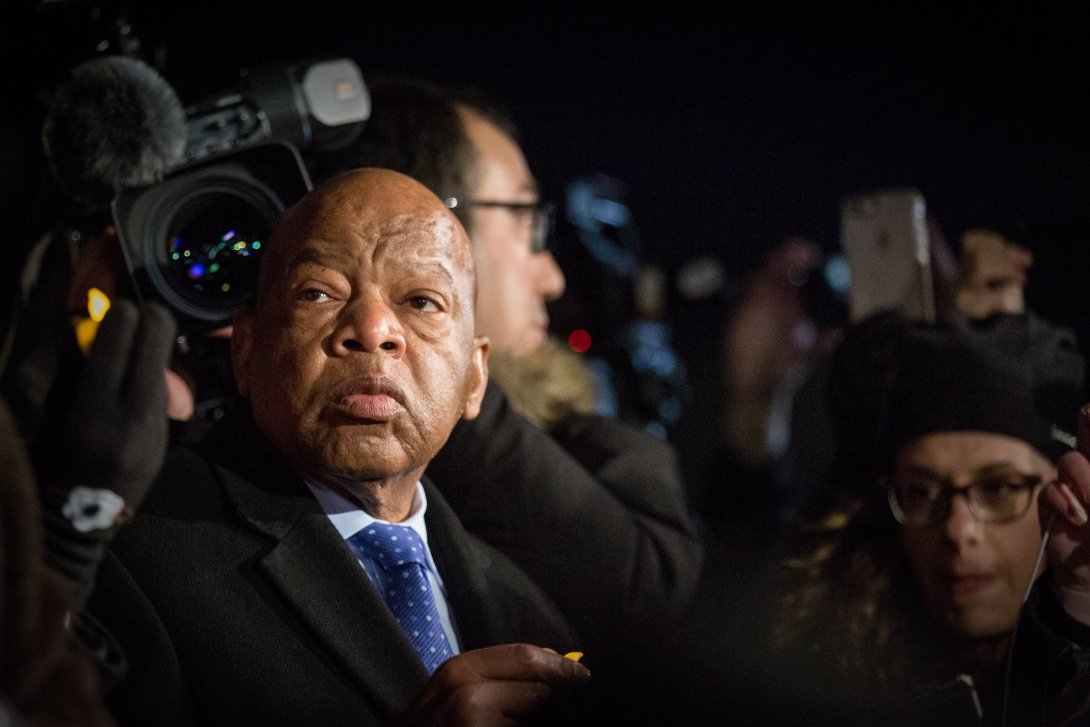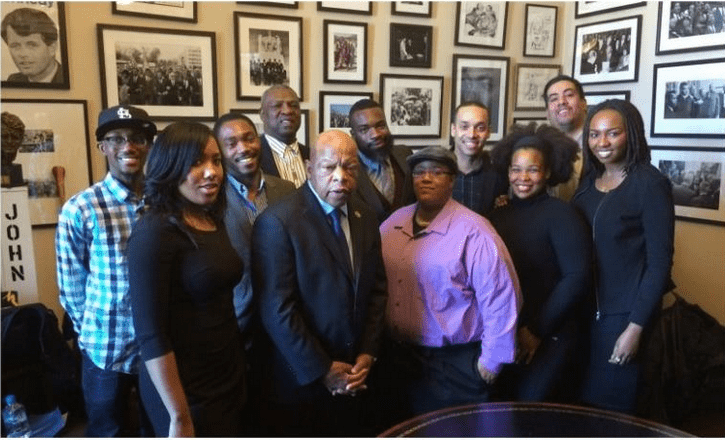John Lewis: A Fighter for Media Justice, Too

Flickr user Lorie Shaull
As our nation mourns the passing of civil-rights icon John Lewis, there will be a lot of discussions about his legacy and his historical impact.
He was a fighter for media justice, too, as I learned firsthand a few years ago.
In January 2015, Malkia Devich-Cyril, then executive director of MediaJustice, organized a delegation of Black racial-justice leaders to go to Washington to call for the passage of strong Net Neutrality rules.
Net Neutrality is the principle that prevents big broadband companies like AT&T, Comcast and Verizon from interfering with internet users’ ability to share and access information of their choosing. The telecom companies, however, were advocating for the power to discriminate online — including blocking websites or prioritizing certain online services while slowing down others.
By 2015, protecting the open internet had become a critical racial-justice issue for Black-led groups. Leaders like Malkia, Rashad Robinson and Brandi Collins-Dexter of Color Of Change, and Bryan Mercer of Movement Alliance Project understood that protecting the open internet was essential to organizing for racial justice because it allowed the community to speak for themselves and tell their own stories without needing to ask permission from any gatekeepers.
Just days before the delegation’s visit, Black Lives Matter co-founder Patrisse Khan-Cullors authored the Op-Ed “Why Black Lives Depend on a Free and Open Internet.” She wrote:
“Because of network neutrality rules, activists can turn to the internet to bypass the discrimination of mainstream cable, broadcast and print outlets as we organize for change. It is because of net neutrality rules that the internet is the only communication channel left where Black voices can speak and be heard, produce and consume, on our own terms.”
And Lewis understood this as well.
In December 2010, Lewis joined other lawmakers in calling on Obama’s Federal Communications Commission to pass strong and enforceable Net Neutrality rules. But the big broadband companies and their powerful lobby organized congressional opposition from a significant number of Democrats — including Black and Latinx members — and from several legacy civil-rights groups to prevent this from happening.
By 2015, as the delegation was set to visit members of the Congressional Black Caucus and the FCC, the agency was poised once again to vote on Net Neutrality regulations.
I helped set up the meeting with Congressman Lewis. I had been lobbying his office for several years on the issue in my role at Free Press Action. But this was not a typical D.C. meeting.
Among the delegation members were another Black Lives Matter co-founder, Opal Tometi, BLM activist Darnell Moore, Million Hoodies’ Dante Barry, and advocates from Color Of Change and Free Press Action.
When we arrived, as I recall, Andrew Aydin, the congressman’s telecom staffer, escorted us into Lewis’ office, where the legendary civil-rights leader greeted us.
Members of the delegation were visibly nervous — awestruck. A couple of delegation members teared up.
It was hard not to get emotional when meeting with the congressman, especially in his office, which was also a museum to the history of the civil-rights struggle. There were pictures covering almost every inch of his office walls. It left you feeling overwhelmed when you fully grasped that you were in the rare presence of a truly historical figure.
I believe Malkia got the meeting started by stating the reason for our visit. The congressman quickly replied that he stood with us. Laughter broke out that put everyone at ease.
Lewis told us that the civil-rights movement would have accomplished even more had an open internet existed back then. And the delegation told Lewis about the importance of the open internet in the fight against police violence and anti-Black media bias. We asked him to continue to speak up in support of Net Neutrality. At the end of the meeting, we took a picture with the congressman and left his office feeling inspired.

Lewis’ support for Net Neutrality served as a public validator that this new generation of racial-justice leaders were standing on the right side of history — even as the industry lied about the harms that open-internet protections would allegedly cause to our communities. And days after the delegation visit, Lewis made this powerful public statement:
“If we had the technology, if we had the internet during the movement, we could have done more, much more, to bring people together from all around the country, to organize and work together to build the beloved community. That is why it is so important for us to protect the internet. Every voice matters, and we cannot let the interests of profit silence the voices of those pursuing human dignity.”
In February 2015, the Obama FCC voted to pass strong and enforceable Net Neutrality rules that protected the open internet. But in 2017, as the Trump FCC was gearing up to gut these protections, Lewis warned that this was “yet another attack on those attempting to bring about the beloved community.”
Rep. Lewis, along with other Black and Latinx congressional champions like Reps. Maxine Waters, Barbara Lee and Raul Grijalva, and activists like those in our delegation, were able to place racial justice at the center of this fight. And the support among Democratic congressional members for Net Neutrality has continued to grow. In 2019, Lewis joined with every Democrat in the House to vote to save the internet and overturn the Trump FCC’s Net Neutrality repeal.
Like so many issues that Lewis spent his life fighting for, the struggle for a free and open internet continues.
The congressman was known for urging everyday people to get into “good trouble” when they witness injustice. And that’s something all of us who had the privilege to be in his presence must continue to do.